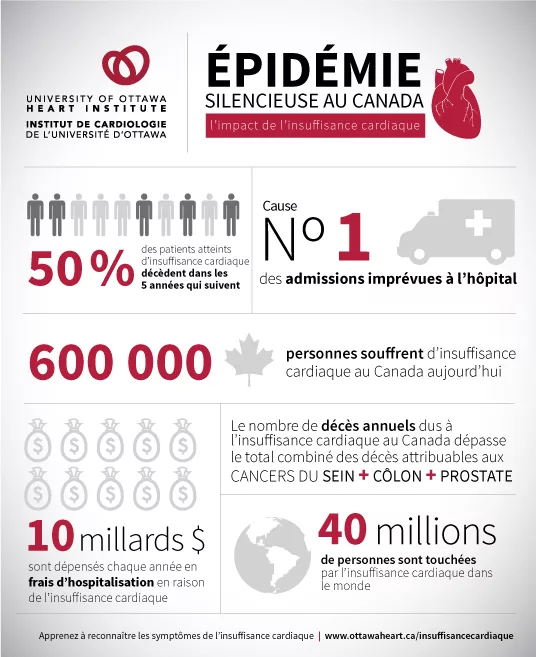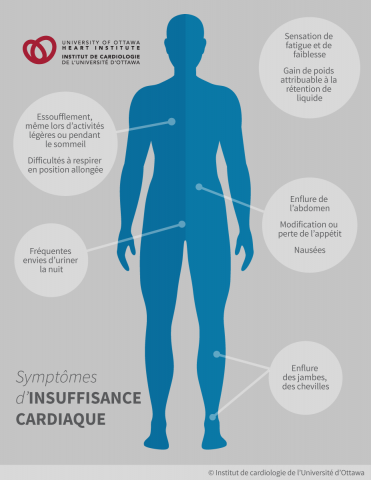Welcome »
Heart failure (Also called: congestive heart failure, chronic heart failure)
Posted by Cyril Grither on July 24, 2023

Heart failure is a disease that occurs when the heart fails to pump blood as efficiently as it should. When this happens, your body no longer gets enough blood and oxygen to meet its needs. It is the diagnosis of heart failure that generates the greatest number of hospital admissions and, each year, many new cases are diagnosed.
The heart is a muscle that acts like a pump and has the main function of pumping blood through your body. Heart failure occurs when your heart is no longer strong enough to supply your body with all the blood and oxygen it needs, and this happens if your heart has been damaged or weakened. Your heart then works with more intensity than usual, but less efficiently. The increased strain on the heart can lead to physical changes over time, such as enlargement (enlargement) of the heart or thickening of the walls of the ventricles.
A diagnosis of heart failure does not mean that your heart will suddenly stop beating or that you will soon die. It teaches you that your heart has to work too hard to keep blood flowing throughout your body.
SILENT EPIDEMIC IN CANADA: the impact of heart failure: 50% of patients with heart failure die within 5 years. #1 cause of unplanned hospital admissions. 600,000 people su er from heart failure in Canada today. 10 billion $ are spent each year on hospitalization costs due to heart failure. The annual number of deaths from heart failure in Canada exceeds the combined total of deaths from BREAST, COLON and PROSTATE CANCER. 40 million people are affected by heart failure worldwide.

The heart team
Heart failure is a complex disease which, without careful monitoring and management, can progress and worsen. At the Heart Institute, the heart failure team brings together specialists from many disciplines around a holistic approach that helps determine what care to provide for each patient.
The heart failure team consists of cardiologists, surgeons, anesthesiologists, nurses, nutritionists, rehabilitation specialists and other allied health professionals.
Causes
The main cause of heart failure is heart attack (myocardial infarction), which damages parts of the heart muscle. When, following a crisis, a large part of this muscle is badly damaged, the heart weakens and heart failure can set in. However, heart failure is not a heart attack.
Another important cause of heart failure is long-term hypertension (high blood pressure) that is not well controlled.
Other causes can lead to heart failure, including:
hypertrophy: this is a hardening of the heart muscle which causes it to thicken; cardiomyopathy (from the Greek: cardio which means "heart" and myopathy which means "muscle abnormality") is often observed in the elderly: it is a condition of the heart muscle which can be caused by a virus, excessive consumption alcohol or other causes of unknown origin heart valve disease abnormal heart rhythm (arrhythmia)Symptoms
Here are some of the main symptoms of heart failure:
feeling tired and weak shortness of breath, which can even occur with light activity or sleep difficulty breathing when lying down weight gain due to fluid retention swelling of the legs, ankles or of the abdomenSymptoms of heart failure: feeling tired and weak, shortness of breath, which can even occur during light activities or during sleep, difficulty breathing when lying down; weight gain due to fluid retention; swelling of the legs, ankles or abdomen.

Diagnostic
Many symptoms of heart failure can be confused with the effects of age or physical inactivity. First, your doctor will ask you about your medical history and perform a complete physical examination. Doctors often order tests to determine if you have heart failure, including:
a chest x-ray: to see the size of your heart and see if there is fluid in your lungs an electrocardiogram: to see your heartbeat blood tests: to assess things like your kidney function an echocardiogram or heart scan (MUGA): to see the overall structure of the chambers and valves of the heart and measure your ejection fractionEjection fraction (EF) is a measure of your heart's pumping ability. In people who have a healthy heart, the ejection fraction is 50 % and above. Many patients with heart failure have an ejection fraction below 40 %; however it is possible to have heart failure despite a normal EF.
Treatment
There are many treatments for heart failure, and research is leading the way to new approaches.
Medications
Certain types of medication help prevent episodes of heart failure and thus promote longevity and good health. Each drug plays a different role. You can find a description of heart failure medications in Heart Failure – A Guide for Patients and Families.
The medications prescribed for you by your doctor are adapted to your condition and the type of heart failure you have. It is common for medications and doses to be changed at the start of your treatment and throughout follow-up.
Changing lifestyle habits
The adoption of a suitable diet, weight loss and physical activity help to alleviate the symptoms and improve the prognosis. In particular, it is essential to limit fluid and salt intake.
Tobacco use, high blood pressure, and being overweight are all factors that increase the risk of developing heart failure and related health problems. There are ways to act on each of these risk factors and thus help prevent the onset of heart failure or other forms of heart disease.
Surgical intervention
For some types of heart failure, surgery may be an option.
Implantable cardioverter defibrillator (ICD) or cardiac resynchronization therapy (CRT) Coronary artery bypass graft Valve repair or replacementHome telemonitoring
Our home telemonitoring program can help patients with heart failure properly follow guidelines for medication, physical activity, and dietary and fluid intake restrictions. It relies on both the results of automated telephone assessments and vital signs data collected remotely.
Patient Education
Patients who are actively involved in managing their heart failure are better able to control their condition, slow disease progression and reduce the likelihood of re-hospitalization. Learning about your condition and knowing what you can do to better manage it are therefore important aspects of treatment.
Our Patient and Family Guide to Heart Failure and related videos give you the tools and information you need to help you and your loved ones get your heart failure under control.
Sources University of Ottawa